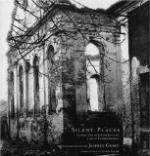Each of the three seemed wrapped in the splendid isolation of his own dream. They strode on sightless, like somnambulists. Only mechanically they kept the trail, and why they did so they could not have told. No coherent thoughts passed through their brains. But always the trees, frost-rimed, drifted past like phantoms; always the occult influences of the North loomed large on their horizon like mirages, dwindled in the actuality, but threatened again in the bigness of mystery when they had passed. The North was near, threatening, driving the terror of her tragedy home to the hearts of these staring mechanical plodders, who now travelled they knew not why, farther and farther into the depths of dread.
But the dogs stopped, and Billy, the leader, sniffed audibly in inquiry of what lay ahead. Instantly, in the necessity for action, the spell broke. The mystery which had lain so long at their horizon, which but now had crept in, threatening to smother them, rolled back to its accustomed place. The north withheld her hand.
Before them was another camp, one that had been long used. A conical tepee or wigwam, a wide space cleared of snow, much debris, racks and scaffolds for the accommodation of supplies, all these attested long occupancy.
Sam jerked the cover from his rifle, and cast a hasty glance at the nipple to see if it was capped. Dick jumped forward and snatched aside the opening into the wigwam.
“Not at home!” said he.
“Gone,” corrected Sam, pointing to a fresh trail beyond.
At once the two men turned their attention to this. After some difficulty they established the fact of a three-dog team. Testing the consistency of the snow they proved a heavy load on the toboggan.
“I’m afraid that means he’s gone for good,” said Sam.
[Illustration: Dick jumped forward and snatched aside the opening into the wigwam]
A further examination of camp corroborated this. The teepee had been made double, with the space between the two walls stuffed with moss, so evidently it had been built as permanent winter quarters. The fact of its desertion at this time of year confirmed the reasoning as to the identity of its occupant and the fact of his having been warned by the dead Chippewa. Skulls of animals indicated a fairly prosperous fur season. But the skulls of animals, a broken knife, a pile of balsam-boughs, and the deserted wigwam were all that remained. Jingoss had taken with him his traps, his pelts, his supplies.
“That’s a good thing,” concluded Sam, “a mighty good thing. It shows he ain’t much scared. He don’t suspect we’re anywhere’s near him; only that it ain’t very healthy to spend the winter in this part of the country. If he’d thought we was close, he wouldn’t have lugged along a lot of plunder; he’d be flying mighty light.”
“That’s right,” agreed Dick.
“And in that case he isn’t travelling very fast. We’ll soon catch up.”




